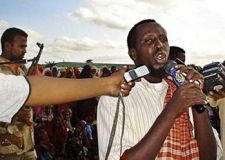Ethiopian troops have to pull out of Somalia – Islamist leader
Jun e18, 2006 (JOWHAR) — The Islamic alliance that has taken control of key areas of Somalia warned of fresh fighting in the shattered country if Ethiopia, which it has accused of launching a military incursion, refuses to pull its troops out of the country.

Joint Islamic Courts chief Sheikh Shariff Sheikh Ahmed said he had “confirmed” that 300 Ethiopian troops crossed into southwestern Somalia early on Saturday to counter his increasingly powerful group.
“We ask them to go (back) to their country, if not their presence will cause a big conflict between the invaders and Somali people,” Ahmed told a news conference in Jowhar, about 90 kilometres (55 miles) north of Mogadishu.
The UN High Commissioner for Refugees (UNHCR) warned of a humanitarian crisis if clashes escalate.
Addis Ababa has denied the incursion charge, saying it had instead boosted troop levels along the countries’ common border because of unspecified provocation by the Islamists. There was no independent confirmation of the charge.
The Ethiopia-backed fledgling Somali transitional government accused the Islamists of lying about the incursion as an excuse to attack President Abdullahi Yusuf Ahmed’s base in Baidoa, about 250 kilometres (155 miles) outside the capital.
“There are no Ethiopian troops in Somalia. We have received intelligence reports that they are using the incursion lies as a pretext to attack Baidoa,” government spokesman Abdirahman Nur Mohamed Dinari told AFP.
“But our army, militia, police and forces are ready to defend the city should they dare attack,” he added.
The Islamists alleged that the United States was encouraging Addis Ababa to check their advance and protect the government.
Largely secular Ethiopia, an ally of the United States in its counter-terrorism efforts, has been wary of the swift victory of the Islamic Courts militia over US-backed warlords in recent fighting.
Western intelligence has accused the courts of harbouring operatives linked to the Al-Qaeda terror network and inviting in foreign fighters, a charge the courts deny.
In addition, Ahmed said his group was ready to renew talks with the Somali government under a proposal from Yemen President Ali Abdullah Saleh, without any conditions.
“We are ready to negotiate with the government without any conditions attached,” he added.
On Thursday, Yemen announced that Ahmed and Yusuf had agreed to talks in or outside Somalia, but Dinari said the transition government had reconsidered its position until the Islamists retreat from the territories they have seized and recognise his government.
Islamists pulled out of preliminary talks in Mogadishu last week to protest the decision by the country’s parliament to discuss the deployment of peacekeepers to protect government officials and help them exert control across the country.
Islamists have vowed to attack peacekeepers who step on Somali soil.
After seizing Mogadishu early this month, the Islamic fighters swiftly marched northwards, overrunning Jowhar in the Middle Shabelle region and a string of other small outposts without heavy resistance.
Ethiopia claims that Islamic fighters are engaged in “provocative activities” from the border town of Beledweyne.
Since the clashes erupted in Mogadishu in February, at least 360 people have been killed and more than 2,000 others wounded, many of them civilians, but residents say the toll could be much higher.
Somalia has lacked an effective government since dictator Mohamed Siad Barre was toppled in 1991 and more than 14 international efforts have failed to restore a functioning administration in the lawless nation of 10 million.
At a press conference In Nairobi, the UNHCR chief Antonio Guterres pressed the world to end the conflict in Somalia or risk a worsening humanitarian crisis.
He called on the international community to help “create conditions for a peaceful settlement of the problems and an adequate political solution.”
(ST)
